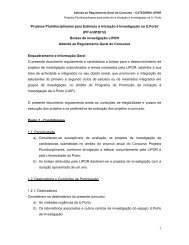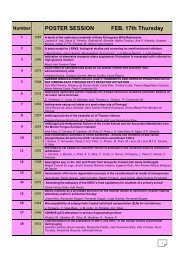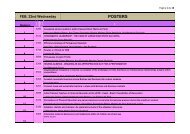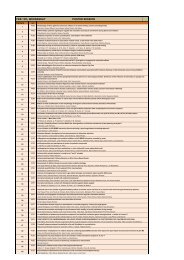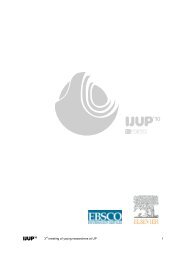IJUP08 - Universidade do Porto
IJUP08 - Universidade do Porto
IJUP08 - Universidade do Porto
- TAGS
- universidade
- porto
- ijup.up.pt
You also want an ePaper? Increase the reach of your titles
YUMPU automatically turns print PDFs into web optimized ePapers that Google loves.
Alfonso X’s General Estoria and the Portuguese Culture: an<br />
example of continuity between Middle Ages and Modernity<br />
Mariana Soares da Cunha Leite 1<br />
1 Master of Arts Student in Romanic Literatures, Department of Portuguese and Romanic Studies<br />
of the Faculdade de Letras da <strong>Universidade</strong> <strong>do</strong> <strong>Porto</strong>, Portugal.<br />
Researcher of the Medieval Seminar of Literature, Thought and Society, Instituto de Filosofia of<br />
the Faculdade de Letras da <strong>Universidade</strong> <strong>do</strong> <strong>Porto</strong>, Portugal<br />
This paper aims to present a synthesis of the research work I have been conducting for the<br />
past year in the field of medieval literature and medieval Iberian culture. It will culminate<br />
in a Master’s degree thesis, due late this year.<br />
Historiography is, beyond <strong>do</strong>ubt, a privileged means of understanding cultures, world<br />
visions and Men’s attitudes towards their past. Within Iberian vernacular historiographic<br />
literature, Alfonso X’s 1252-88 General Estoria (of which only the two first chapters 1 and<br />
fragments of the third 2 were edited – a circumstance that heavily hinders the study of the<br />
text) occupies a particularly conspicuous place. His ambitious project of writing a history<br />
of the world from its remote creation until the birth of Jesus capable of encompassing both<br />
the Greek-Roman and the Judaic-Christian historical traditions, had an impact on<br />
Portuguese culture whose profound consequences have not yet been fully studied. There<br />
existed at least two translations: one into Portuguese 3 , fragmentary, and the other into<br />
Galician 4 , comprising only the first two parts.<br />
Due to the superficiality of the studies produced so far regarding these narratives, we still<br />
ignore which parts of them were more decisive in influencing Portuguese culture – not<br />
only in what concerns historiography, but literate culture in general. In view of this, and<br />
bearing in mind the difficulties posed by the fragmentary nature of the General Estoria, I<br />
will try to analyse the diffusion in Portugal of the Alfonsi text, taking as example an<br />
unpublished manuscript kept at the Biblioteca Pública de Évora. The excerpt I will be<br />
working upon is part of a larger edition of the manuscript, which will be included in my<br />
thesis. In order to make my point more clearly, I will provide a <strong>do</strong>cument with the<br />
transcription.<br />
References:<br />
[1] Solalinde, António G. [ed.] (1930), Alfonso X, General Estoria. Madrid, (s/n). See also:<br />
Sánchez-Prieto Borja, Pedro [ed.] (2001), Alfonso X, General estoria.Madrid, Fundación José<br />
Antonio de Castro.<br />
[2] Sánchez-Prieto Borja, Pedro; Horcajada Diezma, Bautista [ed.] (1994), Alfonso X, General<br />
estoria. Tercera parte. Madrid, Gre<strong>do</strong>s. See also:<br />
Fernández López, María del Carmen [ed.] (1998), Edición crítica del “Libro de Isaías” de la<br />
Tercera Parte de la “General Estoria”. Alcalá de Henares, Servicio de Publicaciones de la<br />
Universidad de Alcalá de Henares<br />
[3] Costa, Avelino Jesus da (1949), Fragmentos preciosos de códices medievais, Braga, Bracara<br />
Augusta.<br />
[4] Martinez-Lopez, Ramón [ed.] (1963), Alfonso X, General Estoria : versión gallega del siglo<br />
XIV : Ms. .I.I. del Escorial. Ovie<strong>do</strong>, Facultad de Filosofia y Letras, Universidad de Ovie<strong>do</strong>.<br />
10





